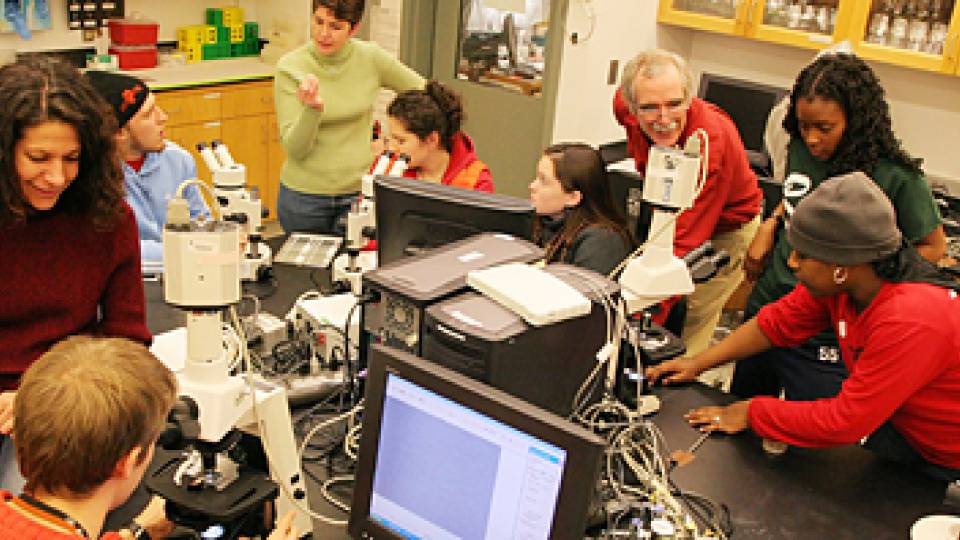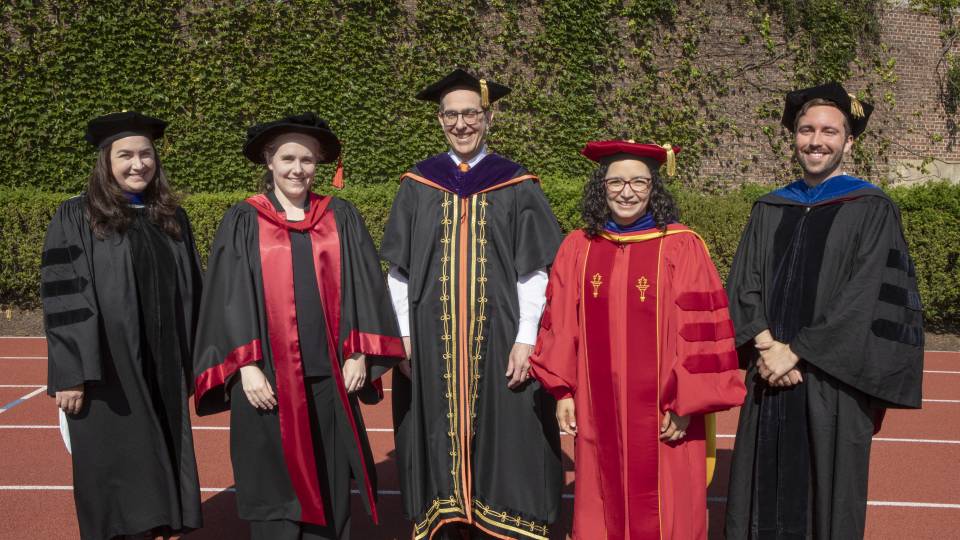Four Princeton faculty members received President's Awards for Distinguished Teaching at Commencement ceremonies June 3.
They are: Bonnie Bassler, the Squibb Professor in Molecular Biology; Pablo Debenedetti, the Class of 1950 Professor in Engineering and Applied Science; Marie Griffith, professor of religion; and Nicole Shelton, associate professor of psychology.
The awards were established in 1991 through gifts by Princeton alumni Lloyd Cotsen '50 and John Sherrerd '52 to recognize excellence in undergraduate and graduate teaching by Princeton faculty members. Each winner receives a cash prize of $5,000, and his or her department receives $3,000 for the purchase of new books.
A committee of faculty, undergraduate and graduate students and academic administrators selected the winners from nominations by current students, faculty colleagues and alumni.
Bassler, who came to Princeton in 1994, co-teaches a popular and highly successful introductory molecular biology course, "From DNA to Human Complexity," for humanities students. "Bonnie's wit, energy and enthusiasm are palpable, but underlying these overt actions is a deep commitment to engaging students in understanding science," wrote one colleague in nominating her for the award.
An alumna who took that class wrote, "We were not a classroom of future research scientists or doctors, and Dr. Bassler, along with the other instructors, made every effort to demonstrate how molecular biology had relevance to our lives too, as future writers, lawyers, artists, historians, etc. -- and, most importantly, as future citizens. With debates over stem cell research, genetic engineering, the teaching of evolution and other biological topics in the news almost every day, I have continued to draw upon the knowledge I gained from MOL 101 to make sense of the issues facing our society."
Bassler also leads a course for graduate students on "Advanced Microbial Genetics" and has served for the past five years as the department's director of graduate studies. She has worked to broaden and revamp the graduate curriculum to include new areas such as quantitative biology and neurobiology. In her classroom and in her lab -- which investigates bacterial signaling -- she has served as a mentor to many students.
"What really struck me was the energy and enthusiasm she had for the subject matter, even when describing elementary principles of biology," wrote one graduate student who served as a teaching assistant for MOL 101. "As for the laboratory portion of the course, she spent her time designing experiments that were interesting and fun for students who had little prior exposure to the lab."
Another graduate student, who was a member of Bassler's lab for four years, wrote, "Not only did Bonnie teach me how to think critically, she taught me to think creatively and to work with diligence and optimism. In the laboratory, Bonnie taught by example. If I gave 100 percent, Bonnie always gave 110 percent."
Debenedetti joined Princeton's chemical engineering faculty in 1985. He is the past chair and current acting chair and director of graduate studies in the department, and in July he will become vice dean of the School of Engineering and Applied Science. In the past four years, he has won five Excellence in Teaching Awards from the Engineering Council based on comments from students.
For the past two years Debenedetti has served as course director for EGR 191, 192, 193 and 194, "An Integrated Introduction to Engineering, Mathematics and Physics," and he also has been one of several teachers for EGR 194 since the course's creation. The four-course sequence is an initiative in the engineering school, involving also the physics and mathematics departments and including both lecture and laboratory components. It is designed to give freshmen early exposure to engineering as well as to integrate the teaching of mathematics and physics in an engineering context. "He has forged a shared vision for the program among the faculty and graduate assistants associated with it, and has skillfully managed its complex elements," wrote one colleague.
Debenedetti also teaches one of the most difficult classes in the chemical engineering curriculum, "Thermodynamics." "We called him the 'Therminator' because of his depth of knowledge in this field," wrote an alumna, "Often we would be daunted by a problem that looked extremely complicated, but Professor Debenedetti had an amazing ability to explain things at a level that we could understand, without sacrificing the problem's elegance."
In addition, Debenedetti teaches two graduate-level classes, "Advanced Thermodynamics" and "Introduction to Statistical Mechanics." "… he encouraged the students to question the validity of the material that he presented," wrote one graduate student. "Often, such questions led to further clarification of the concepts and helped us a great deal in understanding the material. He even gave out goodies like cookies and brownies regularly to students who answered or asked good fundamental questions."
A student from his "Advanced Thermodynamics" course wrote, "One of the reasons I am in graduate school is because I've always loved teaching and would like to one day become a professor. Watching the way Professor Debenedetti conducted himself made me think that this is the way teaching should be done, and I know that he will always remain a role model for me throughout my professional career."
Griffith began working at the University in 1999 as associate director of the Center for the Study of Religion and joined the religion department faculty in 2003. Last fall, she also became director of the Program in the Study of Women and Gender.
"Her exceptional ability to foster robust discussions and to promote rigorous intellectual inquiry is matched by her deep dedication to her students' personal growth as empathetic, thoughtful individuals," wrote a senior who had taken courses from Griffith in "Religion, Gender and Sexuality," "Women and American Religion" and "Women, Gender and Sexuality in the Study of American Religion."
Several students noted Griffith's practice of asking students to submit discussion questions based on the assigned reading. Following her lectures, she uses these questions to stimulate class participation. "By seriously engaging with our analyses, Professor Griffith treated us as if we were her colleagues," wrote another student who took "Evangelicalism in America." "… In order to meet this standard, I felt challenged week after week to produce work of a steadily elevated caliber."
Others described how much they learned by working with Griffith, who is devoted to her students and demands the best from them. "Professor Griffith is truly dedicated to her students," wrote one senior. "What's more, she's excited about her students and their work. … Upon reading the first paper I wrote for her (which was, in truth, rather pitiful), she was genuinely excited about the potential for the few nuggets of good analysis to be expanded and improved, rather than rolling her eyes and giving up on a piece of 'scholarship' that was almost entirely trite and ill-organized."
Graduate students wrote of her efforts to meticulously plan seminars so that they are most relevant, to make careful comments on their dissertation drafts, to introduce them to colleagues at professional conferences and to provide advice as they plan for their futures. "I almost certainly would have never come to Princeton were she not here," wrote one, "and I simply cannot imagine choosing to pursue graduate work elsewhere after having worked with her."
Shelton, who came to Princeton in 2000, teaches the standard lecture class in "Social Psychology." She also has created two new courses, "Research Methods in Social Psychology," a class that positions students to conduct better research, and "Close Relationships," a class focusing on intimacy development.
A senior who took the "Social Psychology" course wrote, "Using everything from classic psychology demonstrations to clips from shows like 'Friends,' Professor Shelton was able to communicate the material to the class in a way that was both memorable and meaningful. While one expects to gain only a superficial knowledge of a subject in an introductory class, Professor Shelton was able to use the readings and papers she assigned to deepen our knowledge and allow us to explore areas that interested us in a more thorough and scholarly way."
Another senior who took both "Social Psychology" and "Close Relationships" wrote, "She truly cares about conducting a lecture that the students will not only understand, but also be interested in. I know this for a fact because she contacted me outside of class last year toward the beginning of a semester to ask for my honest input … of what I thought she could do better, what topics were relevant and interesting to the students, what topics she should include more of or less of, etc."
Graduate students cited her example as a researcher, mentor and educator. "She actively facilitated a comfortable environment with ideas shared freely and criticized constructively," wrote one. "These skills proved invaluable as a first-year graduate student learning to contribute appropriately to academic dialogue."
An alumna who was advised by Shelton on her junior paper and senior thesis wrote, "On every level, Professor Shelton has been the greatest teacher and influence on my career at Princeton. As a young woman who is at the top of her field, she is an inspiration to her students, but what is more impressive is her dedication to her students. She makes herself available at all hours and is willing to meet with any student. She encourages students to question everything and draw their own conclusions. Furthermore, she understands how to get through to students by taking technical material and making it applicable in the real world."

